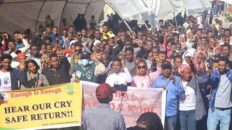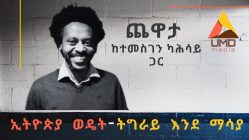Batseba Seifu (April 19, 2024)
A Journey Unfulfilled
Time has elapsed since the signing of the Pretoria Agreement, which brought in cease fire in Tigray, a region entrenched in war and desperation. Over sixteen months have passed, marked by a mix of optimism, disappointment, and continued struggle. Initially met with optimism and resolve, the agreement charted a path to peace for Tigrayans, signed by the Tigray People’s Liberation Front (TPLF) and the Ethiopian government under the auspices of the African Union (AU). Yet, as time has passed, the pledges of the Pretoria Agreement have largely gone unmet, leaving Tigrayans entangled in broken assurances and ongoing hardship.
Foundations of Hope, Pillars of Disappointment
At its core, the Pretoria Agreement rested on three pillars: unhindered humanitarian access, the reinstatement of constitutional order, and the safeguarding of fundamental human rights. These pillars were envisioned as the bedrock of a new era of peace and stability, offering a glimmer of hope amid the darkness of war. Regrettably, political expediency, bureaucratic hurdles, and a lack of political will have caused these pillars to crumble, trapping Tigrayans in a cycle of despair.
Humanitarian Crisis: Ignored and Stripped of Aid
The denial of the unfolding humanitarian crisis in Tigray by the Federal Government stands as a stark testament to the Pretoria Agreement’s failure to alleviate the suffering of its people. Despite explicit provisions for unimpeded humanitarian aid, large portions of Tigray remain cut off from life-saving assistance, held hostage by a government unwilling to acknowledge the gravity of the situation. The Ethiopian government’s refusal to recognize the dire needs of its citizens has plunged Tigray into a state of deprivation and famine. Countless lives hang in the balance as malnutrition rates soar, and the spectre of famine looms ever closer.
Misuse and Exploitation of Aid: Exploiting the Vulnerable
Even when humanitarian aid manages to breach the barriers erected by authorities, reports of its diversion and exploitation have emerged, laying bare the ugly underbelly of greed and opportunism that thrives amidst chaos. Instead of reaching those most in need, aid meant for the impoverished and vulnerable has been co-opted, sold on the black market, or redirected for nefarious purposes, perpetuating a cycle of exploitation and betrayal that further erodes trust and exacerbates suffering. The very lifeline meant to sustain the vulnerable has been manipulated for personal gain, deepening the humanitarian crisis and prolonging the cycle of suffering.
Constitutional Chaos: Occupation and Marginalization
Moreover, the promise of restoring constitutional order in Tigray, including the reinstatement of the region’s rightful boundaries and the reestablishment of democratic governance, remains a distant dream. Forces affiliated with the Prosperity Party in Bahir Dar, the capital of Amhara Regional State, emboldened by impunity, continue to occupy Tigrayan lands unlawfully, denying the people of Tigray their inherent rights and perpetuating a climate of fear and disenfranchisement. The Ethiopian government’s failure to uphold its commitments under the Pretoria Agreement has only served to deepen the wounds of injustice and marginalization, further alienating the Tigrayan populace from the corridors of power. The very essence of democratic governance and the rule of law has been undermined, leaving Tigrayans feeling betrayed and abandoned by those sworn to protect their rights.
Violations of Human Rights: Silencing Dissent
Furthermore, the Pretoria Agreement’s pledge to uphold human rights has been systematically violated, with arbitrary arrests, extrajudicial killings, and widespread abuses of power. Artists, activists, and ordinary citizens brave enough to speak out against the atrocities unfolding in their homeland have been met with intimidation, censorship, and persecution, their voices silenced in a bid to maintain the status quo. The very fabric of Tigrayan society, built on principles of freedom and justice, has been torn asunder, leaving scars that may take generations to heal.
Eritrean Occupation: Undermining Sovereignty
Despite the clear provisions of the Pretoria Agreement, Eritrean forces continue to occupy Tigray, flouting international norms and trampling on the region’s sovereignty and security. The presence of foreign troops on Tigrayan soil not only perpetuates the cycle of violence and instability but also constitutes a flagrant violation of the principles of self-determination and national sovereignty enshrined in the agreement. The sovereignty of Tigray, and indeed of Ethiopia as a whole, has been undermined, leaving its people feeling powerless and vulnerable in the face of external aggression.
International Inaction: Failing Justice
While the international community has expressed concern over the deteriorating situation in Tigray, meaningful action to hold the Ethiopian government accountable has remained elusive. Despite mounting evidence of atrocities and human rights abuses, the perpetrators have continued to act with impunity, emboldened by the lack of consequences for their actions. The failure of the international community to intervene effectively has only served to prolong the suffering of the Tigrayan people, leaving them feeling abandoned and forgotten by the world at large.
Urgent Call to Action: Restoring Hope
In the face of such pervasive suffering and injustice, urgent international action is needed to compel the Ethiopian government to honour its commitments under the Pretoria Agreement. The international community must leverage its collective influence to ensure unrestricted humanitarian access, uphold human rights, and restore constitutional order in Tigray. Enhanced mediation efforts, under the auspices of the AU, regional powers, and relevant UN agencies, are essential to address the root causes of the conflict and pave the way for genuine accountability centred reconciliation and healing. The time for empty promises and half-measures has passed; only through concerted and decisive action can the promises of the Pretoria Agreement be realized, bringing an end to unmet expectations and ushering in a new era of peace, justice, and dignity for the resilient people of Tigray.
The fate of Tigray hangs precariously in the balance, and the international community can no longer afford to remain passive spectators to the suffering of its people.




